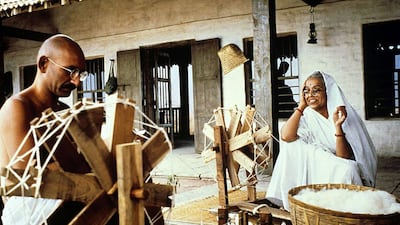Historical biopics have traditionally fared well on Oscars night. Just look at this year’s ceremony, when four of the nine Best Picture nominees were, to some degree or another, biopics: Darkest Hour told the story of Winston Churchill; The Post centred on Washington Post editor Katharine Graham; Dunkirk focused on the evacuations of Dunkirk; and Phantom Thread told the story of a fashion designer, Reynolds Woodcock, said to be “loosely” based on the life of designer Charles James. Some of the biggest Oscar winners of all time have been biopics, and this is the bar the producers of the forthcoming film of the life of Sheikh Zayed have set for themselves, with talk of potential Oscars success. Here are some of the movies the new film will have to stand shoulder-to-shoulder with, if it is to achieve these goals. All of our choices below won the Academy Award for Best Picture, and plenty more besides. Orson Welles’s biographical Citizen Kane, with lead character Charles Foster Kane based on newspaper magnate William Randolph Hearst, did not pick up a Best Picture Academy Award so does not appear in our list, despite being referred to one of the greatest films ever made.
________________________
'12 Years a Slave' (2013, Oscars: 3)
Solomon Northup may not be the most famous historical figure to feature on our list, but he’s surely one of the most inspiring. Northup, a New York-born African-American was kidnapped in Washington DC and sold into slavery in 1841. Northup was given the false identity of a runaway Georgian slave, and thus began a 12-year ordeal of being passed around the plantations of the southern slave states and routinely abused by owners using varying degrees of sadism. It’s a moving experience, all the more so because when Northup finally manages to get word back to his friends in the North and to win back his freedom, we know there’s no such hope for his newfound friends on the plantations. The film is based on Northup’s own 1853 memoir, and featured future stars Chiwetel Ejiofor, Lupita Nyongo’o, Michael Fassbender and Benedict Cumberbatch under the direction of Steve McQueen.
________________________
'Schindler’s List' (1993, Oscars: 7)
Steven Spielberg tells the story of Oskar Schindler, who saved more than 1,000 Polish Jews during the Nazi Holocaust, by employing them to work in his factories. Schindler successfully kept his employees out of the death camps by persuading Nazi officials that their work was essential to the German war effort. He even convinced SS guards to spare his workers’ lives as the German war effort crumbled. Ironically, as the Russian Red Army advanced to liberate Poland, he found himself a fugitive since, on paper, he was a Nazi Party member and war profiteer. Liam Neesom, Ralph Fiennes and Ben Kingsley star.
________________________
'Gandhi' (1982, Oscars: 8)
Biopic mainstay Ben Kingsley stars in Richard Attenborough’s film, based on the life of Mohandas Karamchand Gandhi, the leader of India’s non-violent, non-co-operative, independence movement against British rule in the early and mid-20th century. Following Gandhi from his time in South Africa, where he succeeded in winning limited civil rights for Indians from a discriminatory government, through to his struggle in India and the elation of winning independence, and then the disappointment of the ensuing partition of the nation, the film is an abject lesson in British colonial sins and individual resilience.
________________________
'Lawrence of Arabia' (1962, Oscars: 7)
Surely the film the forthcoming Sheikh Zayed biopic is most likely to draw comparisons with. Although the film is ostensibly the biopic of English army officer T E Lawrence, who united the warring tribes of the Arabian Penisula against the Ottoman Empire during the First World War, few films have studied Arabian life and the region’s landscapes in such epic detail. The movie also delivered a rare Arab Oscar nomination when Omar Sharif was put forward, unsuccessfully as it transpired, for his role as Sherif Ali. Peter O’Toole stars in the title role, with Alec Guinness as Prince Faisal.
________________________
'Ben-Hur' (1959, Oscars, 11)
The most successful film of all time at the Oscars, with 11 statuettes (Titanic and The Lord of the Rings: The Return of the King also have 11, but had an extra two categories to try for compared with 1959), Ben-Hur proves a point that, although Hollywood does not venture into the Arab world often, unless a terrorist plot is required, when it does so, the Oscars beckon. William Wyler's historical epic was never actually shot in the Middle East but was filmed in Rome, on location and on a backlot of 300 sets and nine sound stages. Key characters were played by westerners – Charlton Heston as the Hebrew merchant Ben-Hur and Welsh actor Hugh Griffith as the Arab lead Sheikh Ilderim. This historical epic also produced some of the best-known continuity errors, such as watch-wearing chariot racers, proving a pedant's delight.
___________________
Read more:
Hollywood film to be made about Sheikh Zayed
Details of Tom Cruise's dangerous stunt made over Abu Dhabi desert revealed
Malek Akkad’s battle with censors to re-release father's film 'The Message'
___________________

